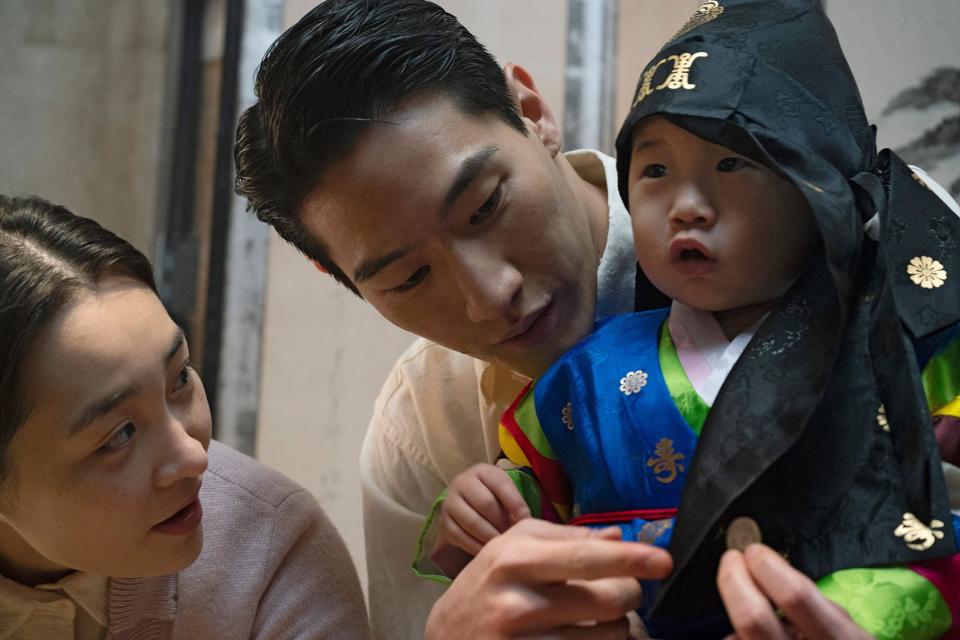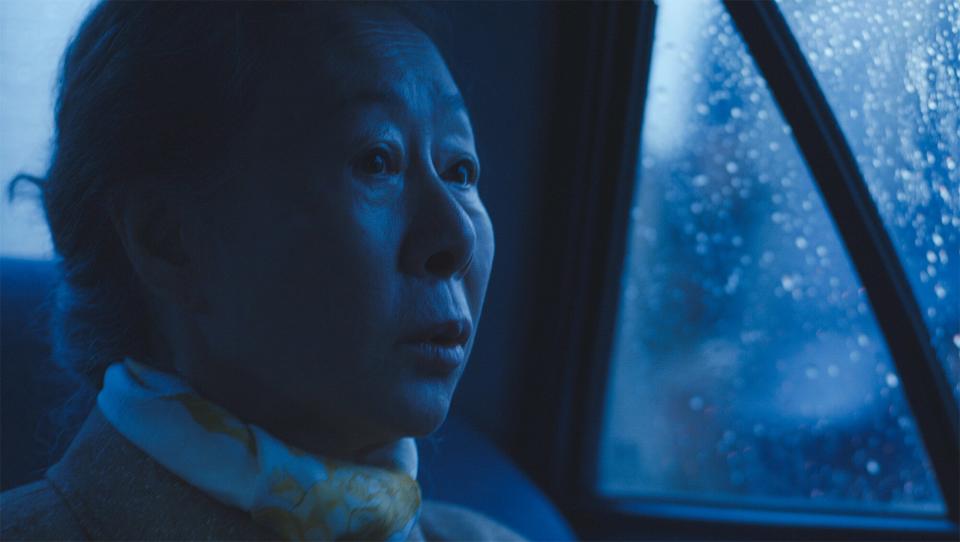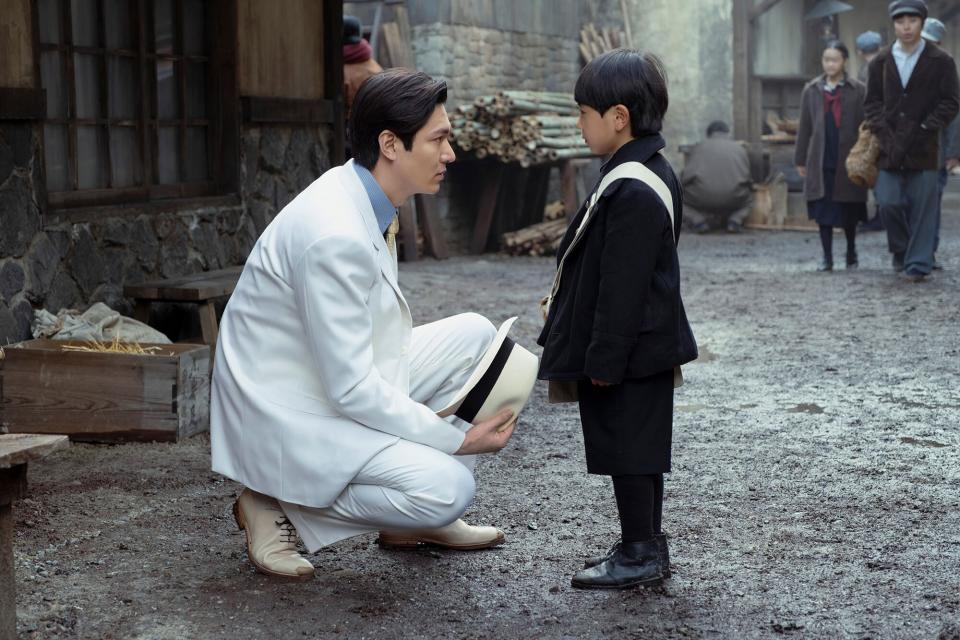Why the Pachinko showrunner wants you to 'call your parents' after watching the season 1 finale
Warning: This article contains spoilers from the season 1 finale of Pachinko.
The season 1 finale of Pachinko concludes at a port in Osaka in 1938. A young Sunja (Minha Kim) wheels two large barrels of kimchi through a bustling open air market. In contrast, at a hospital in 1989, her future grandson Solomon (Jin Ha) storms into the room of his ailing childhood friend, Hana (Mari Yamamoto), and in an anguished but gleeful haze, hastily wheels her gurney through the sterile halls to get her to the roof. She contently gazes at the sky one last time before she succumbs to AIDS. The scenes, it seems, speak to the contrasting nature of life and death.
At the port, young Sunja takes her future into her own hands. She's selling homemade kimchi to support her two young sons following the incarceration of her husband Isak, played by Steve Sanghyun Noh. The mild-mannered pastor has been arrested for his involvement with a left-leaning movement that advocates for peace and fair wages in a militant Japan. The moment feels very much like a rebirth for Sunja, or, as series creator and showrunner Soo Hugh puts it, "A true end of something, but also a beginning."
The series, based on Min Jin Lee's bestselling novel of the same name, follows four generations of a Korean immigrant family led by the indomitable Sunja (played masterfully by Minha in one stage of her life and Oscar winner Yuh-Jung Youn in another). Set mostly against the backdrop of Japan's annexation of Korea, the series is rooted in survival, so it was a "no-brainer," Hugh says, to conclude in such a simple, yet hopeful, way.

Robert Falconer/Apple TV + Minha Kim and Steve Sanghyun Noh in 'Pachinko'
Below, Hugh discusses the finale, her mother's unexpected reaction to the show, hopes for season 2 — which was officially greenlit Friday, after EW spoke with Hugh — and more.
ENTERTAINMENT WEEKLY: What drew you to adapt Min Jin Lee's novel for TV?
SOO HUGH: I'm always drawn to the challenge of what we have not seen before. I don't want to do the same thing over and over again. But also, what's a story worth telling? There's so much media out there. There's so many TV shows. I don't want to just add noise for the sake of adding noise. When I think about how hard it is to make a TV show, just how much you are asking from people, I want to be able to ask people to work on a show that I can stand by and that I know that I will bleed over. I can't bleed over something that I don't care about. So I think when I read this book and I thought about what it could be, I knew this was going to be that journey.
What were some of the challenges of bringing it to the screen?
There's been quite a few along the way. I mean, how do you first do justice to a book like that? That was foremost the biggest challenge. And then second, the language component. Not only in the translation of the scripts, but also in the performance. And then in post-production, that was a challenge. We shot during COVID. We shot in multiple countries. We shot with an enormous cast and crew. But all those challenges, I think that's why the making of this show has been just so special and rewarding. In each of those challenge buckets, I feel like we really turned them into strengths eventually.
You're bringing complex characters to the screen. Was the casting process difficult, in terms of finding Sunjas across three different generations, etc?
Yeah. I mean, casting is one of my favorite parts, but this show was challenging because these characters have lived in my brain for so long now. All of a sudden, people are speaking your words and you sort of cringe and you're like, "Oh, that's a terrible line. Why did I write that?" But we had so many characters to cast and we did a global search — not just Korea, Japan, America, but Canada, Australia, and the UK. The mandate was to find the best actor, period, for each role, who is born to play these parts, and that took a lot of time.
Rice appears to be pivotal to Pachinko. Koreans didn't have access to their own rice during that time, per the series; they were preserved for the Japanese, but was there deeper intention in placing them more frequently in heavier scenes? Am I reading too much into the rice?
No, I think you absolutely got it. Rice is a huge metaphor in this show. When Koreans say, "Do you want to eat? Have you eaten rice?", that is a staple, and I was shocked when we were digging into it. We did so much food research on this show. When I looked into the history of rice — especially in the 20th century and how it was used for political means — it felt like within this one staple, you can tell this story of the 20th century. And it's a story of colonization. But what I love is in the [scene] where Kyunghee makes the rice, what you see is a mother's love, and I thought it was such a powerful way to hang that emotion.

Media Res/Blue Marble Pictures/Apple TV+ Youn Yuh-Jung in 'Pachinko'
The last scene in the finale is simple yet powerful: Sunja sells kimchi to support her family after Isak is imprisoned. I'm sure there were many ways to conclude this season. How did you land on this?
That, for me, was a no-brainer. That came very quickly. I knew that the end of the first season was going to be that ending because it feels both a true end of something, but also a beginning. So, a launching off point. And I wanted to leave the first season with audiences feeling that this young woman is indomitable.
And post-credits, the finale features real-life accounts of Korean women who lived in Japan during that time.
We went to the firsthand accounts in our research and just the incredible stories of what these women, these first generation [women], did to live and feed their family. The book is fiction, the show is fiction, but the reason why that ending is so important for an audience is to remind people that real-life people live these stories. And I wanted to celebrate these women's faces. You look at their beautiful, beautiful faces and see all of the years that they've lived through. It's honestly a tribute to them. That's what this is. We deserve to hear their voice.
Yeah, the series is fiction, but draws on historical events. Did your own family history shape how you approached adapting the series?
Absolutely. What's interesting is — and I've heard this from so many other immigrants — there's so many blank spaces with our families, especially when you leave your homeland; things that have been left unsaid, unspoken. For so long, I just assumed the reason why we never spoke about certain things was because nothing happened. Now through doing Pachinko, I realized the reason why there are those blank spaces is because it's their residue of trauma. It is a form of therapy and healing to be able to talk about that. This show, for me personally, has really allowed that healing to happen.

Robert Falconer/Apple TV + Lee Minho and Jae Jun Park in 'Pachinko'
Is this something you'll be watching with your family? What do you think their reactions will be?
It's funny. So my mom has been very supportive of my career, but she's always been a little... When you tell your mom, your immigrant mom, that you want to be a filmmaker, there is that little bit of grieving of like, "What have I done wrong?" [Laughs]. She's always liked watching my shows, but says, "So why [is there] always a monster in your shows?" I told her I was doing Pachinko and sent her the book to read in Korean. After she read the book, she would text me all throughout production and be like, "What scene are you shooting today? What's happening today? Did this actress nail this?" Her interest in this show is of a different caliber. I think she's just so proud that her people's story is coming to life.
With the novel, there's still so much more story to tell, especially Noa's story, who has a particularly tragic arc. The finale was open-ended; was this a deliberate set up for season 2?
It's meant to be an ongoing series, yeah. It hasn't been greenlit, but it's always been thought of as an ongoing series.
Let's say it's greenlit. What would you be most excited to explore?
I love these characters so much and there's so much story to tell. Right now my brain is so into season 1, because it's been this four-year journey. It's just this amazing moment of celebrating with the cast and crew, what they've accomplished. So I haven't even put my brain into that yet. I mean, I think there's so many directions to go, [but] so much of that deep inquiry happens in the writers' room together, which we haven't done yet.
What do you hope audiences take away from the series?
I feel like I want two things: I want them to feel something earned. I don't want to play on cheap emotions. If they laugh, I want that laugh to be earned because our characters truly reached into their bellies. If they cry, I want those tears to be earned because our characters truly moved them. So I really want them to feel something in this. Second — and I know this sounds so cheesy — but I said this in the [show] pitch: After you watch the show, I want you to call your parents and thank the hell out of what they did for you.
This interview has been edited and condensed for length and clarity.
The first season of Pachinko is now streaming on Apple TV+.
Sign up for Entertainment Weekly's free daily newsletter to get breaking TV news, exclusive first looks, recaps, reviews, interviews with your favorite stars, and more.
Related content:

